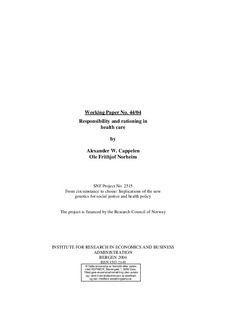Responsibility and rationing in health care
Working paper

Åpne
Permanent lenke
http://hdl.handle.net/11250/165682Utgivelsesdato
2004Metadata
Vis full innførselSamlinger
- Working papers (SNF) [809]
Sammendrag
Objective: People make different choices about how to live their life and these choices have a significant effect on their health, the risks they face and their need for treatment in the future. The objective of this article is, drawing on normative political theory, to sketch an argument that assigns a limited but significant role to individual responsibility in the design of the health care system Method: In developing our argument, we proceed in five steps. First, we review the literature on criteria for priority setting. Second, we explore the most prominent contemporary tradition in normative theory, liberal egalitarian ethics, with the aim to clarify the role of responsibility for choice. In particular we discuss where liberal egalitarian theories would draw the “cut” between the responsibility of the state (which is extensive) and the responsibility of the individuals (which is limited but significant). In the third step, we identify a priority setting dilemma where the commonly advocated criteria would assign equal priority. Finally, we develop a simple model in order to examine the implications of introducing a well-defined notion of responsibility for choice in a priority-setting dilemma of this kind. Results: Liberal egalitarianism holds individuals responsible for choices that affect their health, given that i) the illness is completely or partly a result of individual behaviour and choice; ii) the illness is not life-threatening; iii) the illness does not limit the use of political rights or the exercise of fundamental capabilities; and iv) the cost of treatment is low relative to the income of the patients. The paper shows how this type of considerations can be used to determine an optimal level of co-payments for diseases even when individual choices cannot be observed directly. Conclusions: It is possible to assigns a limited but significant role to individual responsibility in the rationing of health care resources. The liberal egalitarian argument captures a concern that is not captured by traditional criteria for priorities in health care. It can thus help policy makers in situations where the cost-effectiveness of different alternatives and the severity of the illnesses are approximately the same, or if the society wants to assign some weight to responsibility for choice. It can easily be linked to a system of graduated co-payments, but need not be.
Utgiver
SNFSerie
Working paper2004:44